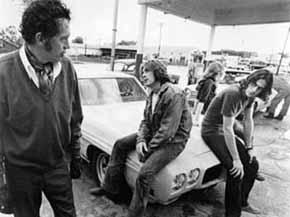|
|
Sole Criterion: Two-Lane BlacktopBy Brett Ballard-BeachMarch 1, 2012
Limited as their acting talent may be, they deliver what is required from the roles: Wilson captures the Mechanic’s easygoing California vibes tempered by the character’s sometimes paralyzing introspection. Taylor’s imposing height and poker face defuse the future “Sweet Baby James” persona and suggests the seething and self-doubt just beneath the surface (but which the film never unleashes, unless you count his provocation/taunt “you’re on, motherfucker” early on to a potential opponent as sufficiently angry. Hearing Taylor cuss is an odd experience). Two-Lane Blacktop would seem to have been the ideal candidate for a tie-in soundtrack that would have pushed along the film’s commercial appeal. There is no score, but there are a fair number of tunes including Kris Kristofferson singing his composition “Me and Bobby McGee” (made famous in a rendition by Janis Joplin). And yet, a soundtrack was never released. There is a reason for this, I think. I would be hard-pressed to name another film where songs are so prevalent and yet the music leaves little to no impression. It provides the soundtrack to the inhabitants of the cars, but the radio is turned off as much as on, and even after debates over which tape to pop in, no one seems to much notice what’s playing, even if they happen to be singing along. The sounds that stay with me are the swell of the cicadas, the electronic buzz of the GTO when the door is opened while the key is still in the ignition, the revving of engines as cars are worked on a racetrack, and finally the absence of any sound, save for a rush of air, during the film’s final minute.
|

|
|
|

|
Friday, November 1, 2024
© 2024 Box Office Prophets, a division of One Of Us, Inc.


